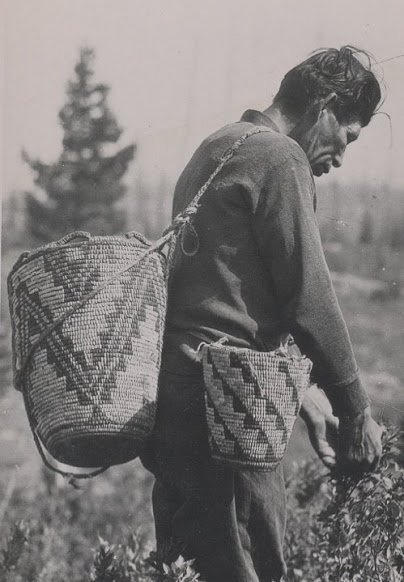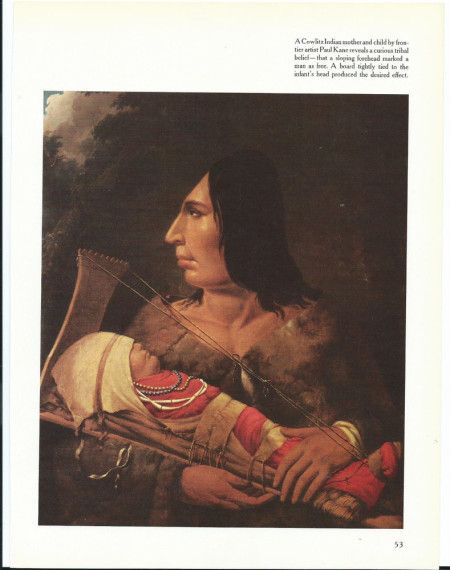Coyote was coming. He came to Gôt’a't. There he met a heavy surf. He was afraid that he might be drifted away and went up to the spruce trees. He stayed there a long time. Then he took some sand and threw it upon that surf: “This shall be a prairie and no surf. The future generations shall walk on this prairie.” Thus Clatsop became a prairie. The surf became a prairie.
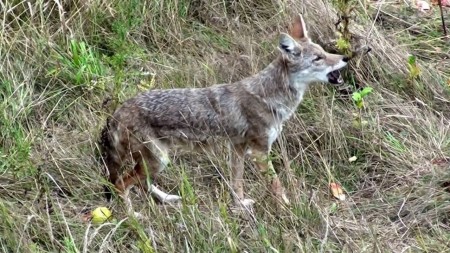 At Niâ’xaqcê a creek originated. He went and built a house at Niâ’xaqcê. He went out and stayed at the month of Niâ’xaqcê. Then he speared two silver-side salmon, a steel-head salmon, and a fall salmon. Then he threw the salmon and the fall salmon away, saying: “This creek is too small. I do not like to see here salmon and fall salmon. It shall be a bad omen when a fall salmon is killed here; somebody shall die; also when a salmon is killed. When a female salmon or fall salmon is killed a woman shall die; when a male is killed a man shall die.” Now he carried only the silver-side salmon to his house. When he arrived there he cut it at once, steamed it and ate it. On the next day he took his harpoon and went again to the mouth of Niâ’xaqcê. He did not see anything, and the flood tide set in. He went home. On the next day he went again and did not see anything. Then he became angry and went home. He defecated and said to his excrements: “Why have these silver-side salmon disappeared?” “Oh, you with your bandy legs, you have no sense. When the first silver-side salmon is killed it must not be cut. It must be split along its back and roasted. It must not be steamed. Only when they go up river then they may be steamed.” Coyote went home. On the next day he went again and speared three. He went home and made three spits. He roasted each salmon on a spit. He had three salmon and three spits. On the next day he went again and stood at the month of the creek. He did not see anything until the flood tide set in. Then he became angry and went home. He defecated. He spoke and asked his excrements: “Why have these silver-side salmon disappeared?” His excrements said to him: “I told you, you with your bandy legs, when the first silver-side salmon are killed spits must be made, one for the head, one for the back, one for the roe, one for the body. The gills must be burnt.” “Yes,” said
At Niâ’xaqcê a creek originated. He went and built a house at Niâ’xaqcê. He went out and stayed at the month of Niâ’xaqcê. Then he speared two silver-side salmon, a steel-head salmon, and a fall salmon. Then he threw the salmon and the fall salmon away, saying: “This creek is too small. I do not like to see here salmon and fall salmon. It shall be a bad omen when a fall salmon is killed here; somebody shall die; also when a salmon is killed. When a female salmon or fall salmon is killed a woman shall die; when a male is killed a man shall die.” Now he carried only the silver-side salmon to his house. When he arrived there he cut it at once, steamed it and ate it. On the next day he took his harpoon and went again to the mouth of Niâ’xaqcê. He did not see anything, and the flood tide set in. He went home. On the next day he went again and did not see anything. Then he became angry and went home. He defecated and said to his excrements: “Why have these silver-side salmon disappeared?” “Oh, you with your bandy legs, you have no sense. When the first silver-side salmon is killed it must not be cut. It must be split along its back and roasted. It must not be steamed. Only when they go up river then they may be steamed.” Coyote went home. On the next day he went again and speared three. He went home and made three spits. He roasted each salmon on a spit. He had three salmon and three spits. On the next day he went again and stood at the month of the creek. He did not see anything until the flood tide set in. Then he became angry and went home. He defecated. He spoke and asked his excrements: “Why have these silver-side salmon disappeared?” His excrements said to him: “I told you, you with your bandy legs, when the first silver-side salmon are killed spits must be made, one for the head, one for the back, one for the roe, one for the body. The gills must be burnt.” “Yes,” said
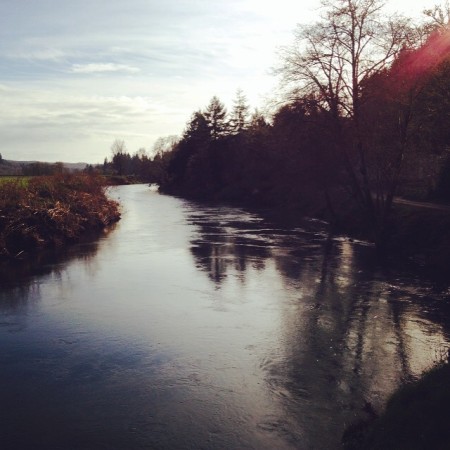
Grays River, WA.
Coyote. On the next day he went again. He killed again three silver-side salmon. When he arrived at home he cut them all and made many spits. He roasted them all separately. The spits of the breast, body, head, back, and roe were at separate places. Coyote, roasted them. On the next morning he went again. He speared ten silver-side salmon. Coyote, was very glad. He came home and split part of the fish. The other part he left and went to sleep. On the next morning he roasted the rest. Then he went again and stood at the mouth of the river. He did not see anything before the flood tide set in. He went home. On the next morning he went again, but again he did not see anything. He went home angry. He defecated and asked his excrements: “Why have these silver-side salmon disappeared?” His excrements scolded him: “When the first silver-side salmon are killed, they are not left raw. All must be roasted. When many are caught, they must all be roasted before you go to sleep.” On the next morning Coyote went and stood at the mouth of the river. He speared ten. Then he made many double spits, and remained awake until all were roasted that he had caught. Now he had learned all that is forbidden in regard to silver-side salmon when they arrive first at Niâ’xaqcê. He remained there and said: “The Indians shall always do as I had to do. If a man who prepares corpses eats a silver-side salmon, they shall disappear at once. If a murderer eats silver-side salmon, they shall at once disappear. They shall also disappear when a girl who has just reached maturity or when a menstruating woman eats them. Even I got tired.”
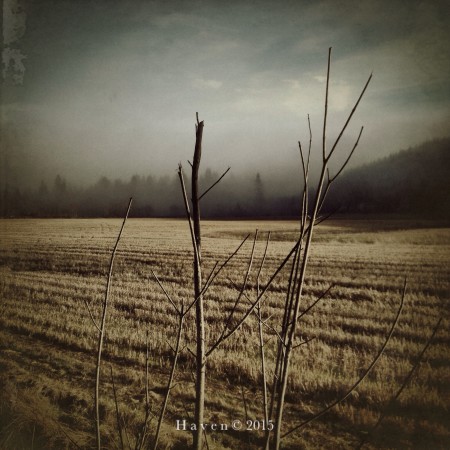
Willapa Hills, WA.
Now he came this way. At some distance he met a number of women who were digging roots. He asked them: “What are you doing?” “We are digging gamass.” “How can you dig gamass at Clatsop? You shall dig [a root, species?] and thistle [?] roots in this country. No gamass will be dug here.” Now they gathered [a root, species?] and thistle [?] roots. He left these women and spoiled that land. He transformed the gamass into small onions.
Then he came to Clatsop. It was the spring of the year. Then he met his younger brother the snake. He said to him: “Let us make nets.” The snake replied: “As you wish.” Now they bought material for twine, and paid the frog and the newt to spin it. Now Coyote cleaned all the material for twine while the snake was crawling about. Then the frog and the newt spun it. Then Coyote said to his younger brother: “Clean it, clean it. You crawl about all day.” Thus he spoke to the snake. Coyote continued: “You shall make one side of the net, I make the other.” Coyote finished his twine and said to the snake: “Quick! quick! you let me wait. Make your net.” The snake replied: “You let me wait.” Thus he spoke to Coyote. Now, Coyote made his net. He finished it all. The two women made the ropes, Coyote made the net buoys; while the snake crawled about. Coyote said: “Make your net buoys; you let me wait.” Thus he said to the snake. The snake replied: “Make haste! you let me wait.” Coyote finished his net buoys. Then he went to look for stones, and the snake accompanied him. They went for stones to Tongue point. The snake crawled about among the stones, while Coyote carried them down. They went home. After they reached home Coyote went to gather spruce roots. The snake accompanied him. Coyote dug, up the ground and the snake crawled about at the same place. They went home. Coyote split the spruce roots. “Go on; work,” he spoke to the snake; “you let me wait.” The snake replied: “Quick, quick; work! you let me wait.” Now Coyote tied his net to the buoys and laid it down flat on a large mat. Then he tied it to the buoys. The snake crawled about at the same place. Coyote finished his net and hung it up outside. Early the next morning he stepped out of the house, and there hung already the net of the snake. “Oh, brother,” he said, “you got the better of me.” Coyote was ashamed. The snake had won over him. Coyote said: “When a person makes a net, he shall get tired before he finishes it. It would not be well if he would not get tired.” The snake said to him: “I told you that you would let me wait.”
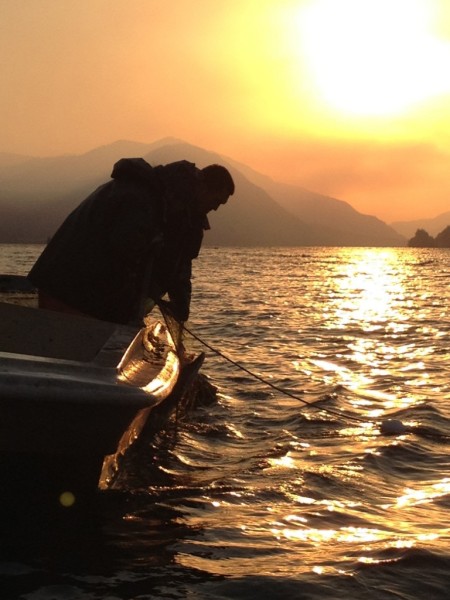
Les Brown photo. ©2012
It got day. Then they went to catch salmon in their net. They laid the net and caught two in it. Coyote jumped over the net. Now they intended to catch more salmon, but the flood-tide set in. They had caught only two before the flood-tide set in. Now they went home. Coyote said that he was hungry, and he split the salmon at once. They roasted them. When they were done they ate. The frog and the newt were their cousins. The next morning they went fishing with their net. The newt looked after the rope, the snake stood at the upper end of the net, Coyote at the lower end. They intended to catch salmon, but they did not get anything until the flood-tide set in. They went home. Coyote was angry. He defecated and spoke to his excrements: “You are a liar.” They said to him: “You with your bandy- legs. When people kill a salmon they do not jump over the net. You must not step over your net. When the first salmon are killed, they are not cut until the afternoon.” “Oh,” said Coyote, “You told me enough.” On the next morning they went fishing. When they had killed a salmon they did not jump over the net. They laid their net twice. Enough salmon were in the net. Then he ordered the newt: “Bail out the canoe, it is full of water.” She bailed it out. Then they intended to fish again, but the flood-tide set in. They went home and put down what they had caught in the house. In the afternoon Coyote split the salmon. He split them in the same way as the silver-side salmon. He placed the head, the back, the body, and the roe in separate places and on separate double spits. They were done. The next morning they went fishing. They did not kill anything. Coyote became angry and defecated. He said to his excrements: “Tell me, why have these salmon disappeared?” His excrements scolded him: “Do you think their taboo is the same as that of the silver-side salmon? It is different. When you go fishing salmon and they go into your net., you may lay it three times. No more salmon will go into it. It is enough then. Never bail out your canoe. When you come home and cut the salmon, you must split it at the sides and roast belly and back on separate double spits. Then put four sticks vertically into the ground [so that they form a square] and lay two horizontal sticks across them. On top of this frame place the back with the head and the tail attached to it.” He said to his excrements: “You told me enough.” On the next morning they went fishing and killed three salmon. They did not bail out their canoe. Then he said to the newt: “Fetch a stick from the woods. We will make a club.” She went and brought a stick. Then they laid their net again. Again a salmon was in it and he killed it with his club. They intended to continue fishing, but the flood-tide set in. They killed four only. They put down their salmon. In the afternoon Coyote cut them and put four sticks into the ground. Now he did as his excrements had told him. When they were done he broke the backbone at once. On the next morning they went fishing. They did not kill anything before the flood-tide set in. They went home. Coyote was angry and defecated. “Why have these salmon disappeared?” he asked his excrements. “I told you,” they said to Coyote; “do you think their taboo is the same as that of the silver-side salmon? It is different. When you kill a salmon you must never strike it with a stick. When they may be boiled, then you may strike them with a stick. When it is almost autumn you may strike them with a stick. Do not break a salmon’s backbone when they just begin to come. When you have killed a salmon take sand, strew it on its eye, and press it with your fist. Do not club it.” Coyote said: “You have told me enough.” On the next morning they went fishing. Salmon went into the net; three went into the net immediately. He strewed sand on each and pressed each. He killed many salmon. They went home and roasted them. When they were done he distributed them among the people of the town above Clatsop. Now they dried them. On the next morning they went fishing. They tried to fish but did not catch anything before the flood-tide set in. They went home. Coyote was angry. He defecated: “Why have these salmon disappeared?” “I told you. you lean one, with your bandy-legs. There are many taboos relating to the salmon. When you have killed many salmon you must never carry them outside the house. You must roast and eat them at the same place. When part is left they must stay it the same place. When you want to dry them you must do so when the flood-tide sets in on the day after you have caught them.” He said to them: “You have told me enough.” On the next morning they went fishing again. They killed many salmon. They roasted them all. When they were done he invited the people. The newt was sent out. They came to eat in Coyote’s house. They finished eating. Then they left there what they had not eaten. Now it was low water in the morning. They went out early to lay their net, but they did not catch anything. They fished until the flood-tide set in. They did not kill anything. They were unsuccessful. Twice they tried to go fishing early in the morning, but they were unsuccessful; they did not catch anything. Coyote defecated and said to his excrements: “Why have the salmon disappeared?” Coyote received the answer: “I told you, you lean one, that the salmon has many taboos. When you go fishing and it is ebb-tide early in the morning, you must not lay your net before sunrise. The salmon must not be carried outside until a crow takes one and carries it outside. Then it must be distributed raw. No fire must be made until daylight; the breast must not be eaten before the next day. When salmon are roasted at a tire and they are done, water must be poured into the fire.” He said to his excrements: “You have told me enough. The Indians shall always do this way. Thus shall be the taboos for all generations of Indians. Even I got tired.”
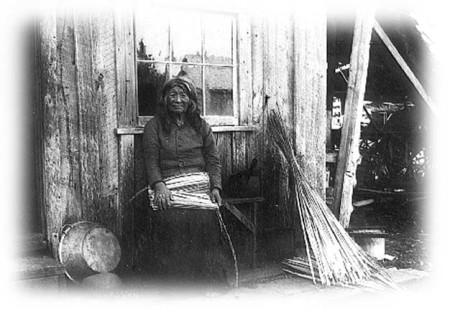
Jennie Michel, descendant of the Clatsop Tribe. Ca. 1900
Thus spoke Coyote about the taboos of Clatsop. He said to his cousins: “We will move to the other side.” The newt made herself ready. Then the snake looked at the frog, who was growling. The snake reached her, struck, and killed her.
Now they arrived here on this side. They went fishing and killed salmon. He did the same way as in Clatsop. He strewed sand on the eye of that salmon. He pressed its eye. Then they intended to fish again, but they did not kill anything. They went home. On the following morning they went again fishing, but they did not kill anything On the next morning they went fishing again, but they did not kill anything. Coyote scolded. He defecated: “Why have these salmon disappeared?” “Oh, you foolish Coyote. When you kill a salmon you must kick it. Do you think it is the same here as at Clatsop?” “Oh, said Coyote. On the next morning they went fishing again. They laid their net and caught two salmon. They laid their net again and caught three salmon. He threw one ashore. It fell down head first so that the mouth struck the sand. They tried to lay their net again but they did not kill anything. They tried to fish until the flood tide set in. They had not killed anything. They had caught five only. They went home. In the evening Coyote cut the salmon and roasted them. They were done. The following morning they went fishing, but did not kill anything. Coyote scolded. He defecated: “Why have these salmon disappeared?” “Oh, you foolish Coyote. Do you think it is the same here as at Clatsop? Do not throw salmon ashore so that the head is downward. It is taboo. When you kill a salmon go and pick salmonberries. When you have caught many salmon put salmonberries into the mouth of each.” “Oh, you have told me enough,” he said to his excrements. The next morning they again went fishing. They killed many salmon. He sent the newt to pick salmonberries. The newt brought salmonberries. Now they put those berries into the mouths of those salmon. It got day and they went fishing again. They met fishermen on the water. A short distance down river they laid their net. They laid it several times and went up the river a short distance. They passed the canoes of those fishermen. They laid their net and intended to fish, but they did not kill anything. They were unsuccessful. They went home. Coyote scolded. He defecated: “Why have these salmon disappeared?” “You lean one! When yon kill a salmon, and you have laid your net at one place and you kill one more, you must lay your net at the same place. You must not pass a canoe with fishermen in it. It is taboo.” “Yes,” said Coyote. On the next day they went again fishing. Coyote said: “Even I got tired. The Indians shall always do in the same manner. Murderers, those who prepare corpses, girls who are just mature, menstruating women, widows and widowers shall not eat salmon. Thus shall be the taboos for all generations of people.”
Chinook Texts by Franz Boas. [1894] (U.S. Bureau of American Ethnology Bulletin, no 20.)
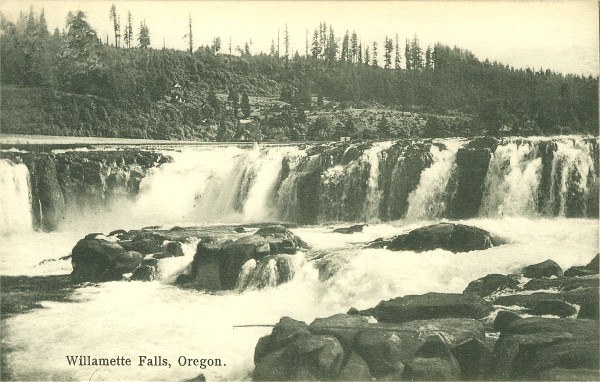 All the Indians came and began to fish. Now Coyote made his magic fish trap. He made it so it would speak, and say Noseepsk! when it was full. Because he was pretty hungry, Coyote decided to try it first himself. He set the trap by the Falls, and then ran back up the shore to prepare to make a cooking fire. But he had only begun when the trap called out, “Noseepsk!”
All the Indians came and began to fish. Now Coyote made his magic fish trap. He made it so it would speak, and say Noseepsk! when it was full. Because he was pretty hungry, Coyote decided to try it first himself. He set the trap by the Falls, and then ran back up the shore to prepare to make a cooking fire. But he had only begun when the trap called out, “Noseepsk!”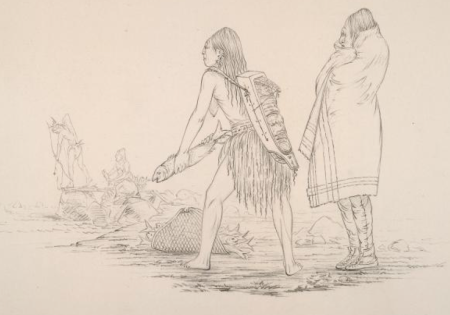
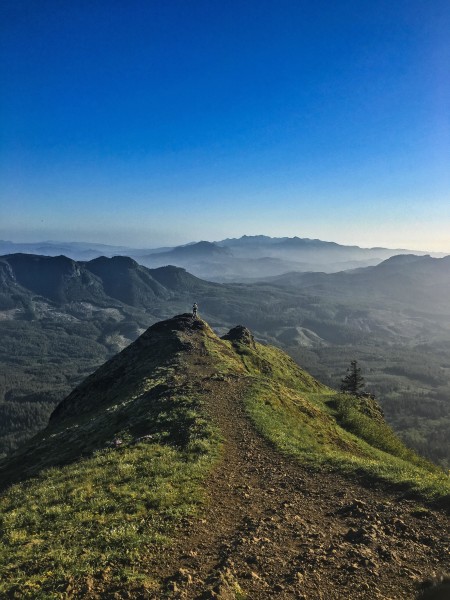
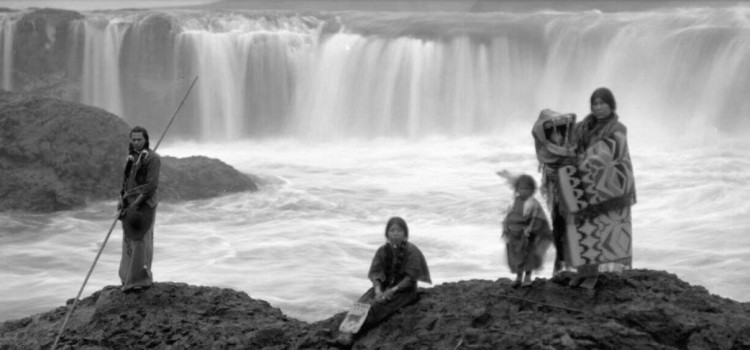
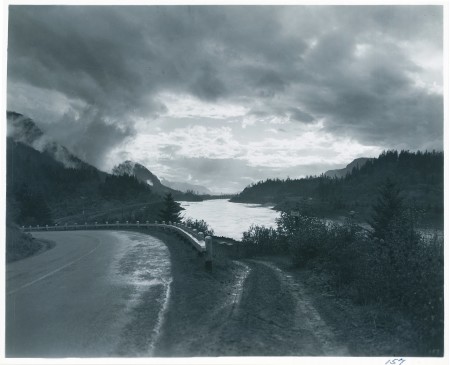



 At Niâ’xaqcê a creek originated. He went and built a house at Niâ’xaqcê. He went out and stayed at the month of Niâ’xaqcê. Then he speared two silver-side salmon, a steel-head salmon, and a fall salmon. Then he threw the salmon and the fall salmon away, saying: “This creek is too small. I do not like to see here salmon and fall salmon. It shall be a bad omen when a fall salmon is killed here; somebody shall die; also when a salmon is killed. When a female salmon or fall salmon is killed a woman shall die; when a male is killed a man shall die.” Now he carried only the silver-side salmon to his house. When he arrived there he cut it at once, steamed it and ate it. On the next day he took his harpoon and went again to the mouth of Niâ’xaqcê. He did not see anything, and the flood tide set in. He went home. On the next day he went again and did not see anything. Then he became angry and went home. He defecated and said to his excrements: “Why have these silver-side salmon disappeared?” “Oh, you with your bandy legs, you have no sense. When the first silver-side salmon is killed it must not be cut. It must be split along its back and roasted. It must not be steamed. Only when they go up river then they may be steamed.” Coyote went home. On the next day he went again and speared three. He went home and made three spits. He roasted each salmon on a spit. He had three salmon and three spits. On the next day he went again and stood at the month of the creek. He did not see anything until the flood tide set in. Then he became angry and went home. He defecated. He spoke and asked his excrements: “Why have these silver-side salmon disappeared?” His excrements said to him: “I told you, you with your bandy legs, when the first silver-side salmon are killed spits must be made, one for the head, one for the back, one for the roe, one for the body. The gills must be burnt.” “Yes,” said
At Niâ’xaqcê a creek originated. He went and built a house at Niâ’xaqcê. He went out and stayed at the month of Niâ’xaqcê. Then he speared two silver-side salmon, a steel-head salmon, and a fall salmon. Then he threw the salmon and the fall salmon away, saying: “This creek is too small. I do not like to see here salmon and fall salmon. It shall be a bad omen when a fall salmon is killed here; somebody shall die; also when a salmon is killed. When a female salmon or fall salmon is killed a woman shall die; when a male is killed a man shall die.” Now he carried only the silver-side salmon to his house. When he arrived there he cut it at once, steamed it and ate it. On the next day he took his harpoon and went again to the mouth of Niâ’xaqcê. He did not see anything, and the flood tide set in. He went home. On the next day he went again and did not see anything. Then he became angry and went home. He defecated and said to his excrements: “Why have these silver-side salmon disappeared?” “Oh, you with your bandy legs, you have no sense. When the first silver-side salmon is killed it must not be cut. It must be split along its back and roasted. It must not be steamed. Only when they go up river then they may be steamed.” Coyote went home. On the next day he went again and speared three. He went home and made three spits. He roasted each salmon on a spit. He had three salmon and three spits. On the next day he went again and stood at the month of the creek. He did not see anything until the flood tide set in. Then he became angry and went home. He defecated. He spoke and asked his excrements: “Why have these silver-side salmon disappeared?” His excrements said to him: “I told you, you with your bandy legs, when the first silver-side salmon are killed spits must be made, one for the head, one for the back, one for the roe, one for the body. The gills must be burnt.” “Yes,” said



